List of Eurovision Song Contest winners
67 songs written by 124 songwriters have won the Eurovision Song Contest, an annual competition organised by member countries of the European Broadcasting Union. The contest, which has been broadcast every year since its debut in 1956 (with the exception of 2020), is one of the longest-running television programmes in the world. The contest's winner has been determined using numerous voting techniques throughout its history; centre to these have been the awarding of points to countries by juries or televoters. The country awarded the most points is declared the winner.[1] The first Eurovision Song Contest was not won on points, but by votes (two per country), and only the winner was announced.[2]
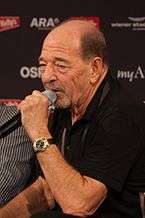
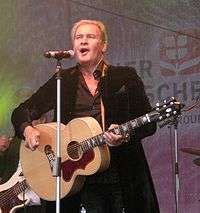
.jpg)
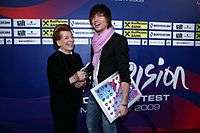

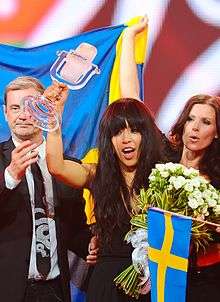
There have been 64 contests, with one winner each year except the tied 1969 contest, which had four. Twenty-seven countries have won the contest. Switzerland won the first contest in 1956. The country with the highest number of wins is Ireland, with seven. The only person to have won more than once as performer is Ireland's Johnny Logan, who performed "What's Another Year" in 1980 and "Hold Me Now" in 1987. Logan is also one of only five songwriters to have written more than one winning entry ("Hold Me Now" 1987 and "Why Me?" 1992, performed by Linda Martin).[3] This unique distinction makes Logan the only person to have three Eurovision victories to his/her credit, as either singer, songwriter or both. The other four songwriters with more than one winning entry to their credit are, Willy van Hemert (Netherlands, 1957 and 1959), Yves Dessca (Monaco, 1971 and Luxembourg, 1972), Rolf Løvland (Norway, 1985 and 1995) and Brendan Graham (Ireland, 1994 and 1996).
Winning the Eurovision Song Contest provides a unique opportunity for the winning artist(s) to capitalise on their success and surrounding publicity by launching or furthering their international career during their singing years. However, throughout the history of the contest, relatively few of these artists have gone on to be huge international stars. The most notable winning Eurovision artists whose career was directly launched into the spotlight following their win were the members of ABBA, who won the 1974 contest for Sweden with their song "Waterloo". ABBA went on to be one of the most successful bands of its time.[4] Another notable winner who subsequently achieved international fame and success was Céline Dion, who won the 1988 contest for Switzerland with the song "Ne partez pas sans moi".
Since 2008, the winner has been awarded an official winner's trophy of the Eurovision Song Contest. The trophy is a handmade piece of sandblasted glass in the shape of a 1950s microphone.[5][6] The song writers and composers of the winning entry receive smaller versions of the trophy.[5] The original design was created by Kjell Engman of Kosta Boda, who specialises in glass art.[5]
Winners
By year
Performers and songwriters with multiple wins
The following individuals have won the Eurovision Song Contest as a performer or songwriter more than once. Bold indicates a win as a performer. Italics indicates a win as a songwriter.
| Wins | Name | Years |
|---|---|---|
| 3 | Johnny Logan | 1980, 1987, 1992 |
| 2 | Willy van Hemert | 1957, 1959 |
| Yves Dessca | 1971, 1972 | |
| Rolf Løvland | 1985, 1995 | |
| Brendan Graham | 1994, 1996 |
Observations
Eleven Eurovision winners (alongside three non-winners) featured at the Congratulations concert in 2005, in which ABBA's "Waterloo" was voted the most popular song of the contest's first fifty years.[7]
Ireland has finished first seven times, more than any other country, Ireland also won the contest for three consecutive years (1992, 1993, 1994), more consecutive years than any other country. Three countries have won twice in a row, Spain (1968 and 1969), Luxembourg (1972 and 1973) and Israel (1978 and 1979). Serbia is the only country to win with its debut entry (in 2007), though Serbia had competed previously as part of Yugoslavia and Serbia and Montenegro. The country achieving the highest position on its first appearance in any form in the Contest is Poland, which came second in 1994 (even Switzerland in 1956 won with its second entry of the night). Under the voting system used between 1975 and 2015, the winner of the contest was decided by the final voting nation on eleven occasions.[N 4]
Changes to the voting system, including a steady growth in the number of countries participating and voting, means that the points earned are not comparable across the decades. Portugal's Salvador Sobral holds the record of the highest number of points in the contest's history, earning 758 with the song "Amar pelos dois". Norway's Alexander Rybak holds the largest margin of victory in absolute points, a 169-point cushion over second place in 2009. Italy's Gigliola Cinquetti holds the record for largest victory by percentage, scoring almost three times as many as second place (49 points compared with 17 by the runner-up) in the 1964 contest. Under the voting system used from 1975 until 2015, the lowest winning score was Norway's Bobbysocks! 123 points earned (of the 216 available from the 18 other countries) when winning Eurovision 1985, while the lowest winning total ever is the 18 points (of the 160 total votes cast by 16 countries) scored by each of the four winning countries in 1969.
Under the voting system used from 1975 until 2015, in which each country gives maximum points to its first place choice, Sweden's Loreen won Eurovision 2012 with the most ever first place votes earned, receiving first place votes from 18 of 41 countries (excluding themselves). The 1976 United Kingdom entrant, Brotherhood of Man with the song "Save Your Kisses For Me" holds the record of the highest average score per participating country, with an average of 9.65 points received per country. 2011 winner Azerbaijan Ell & Nikki, hold the lowest average score for a winning song under that system, receiving 5.14 points per country.
In 2016, Jamala's "1944" became the first winning entry since the jury vote was added alongside the televote starting in 2009 to place first in neither area, coming second in the jury vote behind Australia and second in the televote behind Russia. Duncan Laurence's "Arcade," became the second such winner in the 2019 contest, having placed third behind North Macedonia and Sweden in the jury vote, and second behind Norway in the televote.
The United Kingdom has finished second fifteen times at Eurovision (most recently in 1998), more than any other country. The most successful country never to have won the Contest is Malta, having finished second in 2002 and 2005 and third in 1992 and 1998. Another island nation Iceland has also finished second twice, in 1999 and 2009.
There is no official runner-up for two of the contests – 1956 and 1969. In 1956 only the winner, Switzerland, was announced, whilst there were speculative reports that Germany ended up in second place with "Im Wartesaal zum großen Glück" by Walter Andreas Schwarz, given that Germany was chosen to host the 1957 contest. In 1969 four songs shared first place by achieving the same number of points; fifth place was achieved by Switzerland, which is not considered an official runner-up, because of the draw for first place.
Winners by country
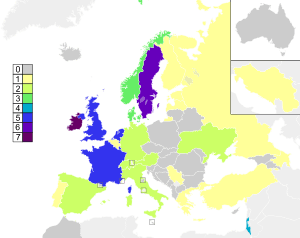
- Table key
| Wins | Country | Years |
|---|---|---|
| 7 | 1970, 1980, 1987, 1992, 1993, 1994, 1996 | |
| 6 | 1974, 1984, 1991, 1999, 2012, 2015 | |
| 5 | 1958, 1960, 1962, 1969, 1977 | |
| 1961, 1965, 1972, 1973, 1983 | ||
| 1967, 1969, 1976, 1981, 1997 | ||
| 1957, 1959, 1969, 1975, 2019 | ||
| 4 | 1978, 1979, 1998, 2018 | |
| 3 | 1985, 1995, 2009 | |
| 1963, 2000, 2013 | ||
| 2 | 1968, 1969 | |
| 1956, 1988 | ||
| 1964, 1990 | ||
| 1982, 2010 | ||
| 1966, 2014 | ||
| 2004, 2016 | ||
| 1 | 1971 | |
| 1986 | ||
| 1989 | ||
| 2001 | ||
| 2002 | ||
| 2003 | ||
| 2005 | ||
| 2006 | ||
| 2007 | ||
| 2008 | ||
| 2011 | ||
| 2017 |
The year 1969 is in italics to indicate a joint (4-way) win
Ranking
- Table key
| Rank | Country | Winner | Runner-up | Third place | Next best placement (frequency) |
|---|---|---|---|---|---|
| 1 | 7 | 4 | 1 | 4th (three times) | |
| 2 | 6 | 1 | 6 | 4th (twice) | |
| 3 | 5 | 15 | 3 | 4th (five times) | |
| 4 | 5 | 4 | 7 | 4th (seven times) | |
| 5 | 5 | 1 | 1 | 4th (twice) | |
| 6 | 5 | 0 | 2 | 4th (five times) | |
| 7 | 4 | 2 | 1 | 4th (twice) | |
| 8 | 3 | 1 | 3 | 4th (twice) | |
| 9 | 3 | 1 | 1 | 4th (three times) | |
| 10 | 2 | 4 | 5 | 4th (four times) | |
| 11 | 2 | 4 | 1 | 4th (twice) | |
| 12 | 2 | 3 | 5 | 4th (twice) | |
| 13 | 2 | 3 | 3 | 4th (six times) | |
| 14 | 2 | 2 | 1 | 4th (once) | |
| 15 | 2 | 0 | 1 | 4th (once) | |
| 16 | 1 | 4 | 4 | 5th (once) | |
| 17 | 1 | 2 | 0 | 4th (four times) | |
| 18 | 1 | 1 | 3 | 4th (four times) | |
| 19 | 1 | 1 | 1 | 4th (three times) | |
| 20 | 1 | 1 | 1 | 4th (once) | |
| 21 | 1 | 0 | 3 | 5th (twice) | |
| 22 | 1 | 0 | 1 | 4th (once) | |
| 23 | 1 | 0 | 1 | 5th (once) | |
| 24 | 1 | 0 | 1 | 6th (once) | |
| 25 | 1 | 0 | 0 | 4th (three times) | |
| 26 | 1 | 0 | 0 | 6th (once)[N 6] | |
| 27 | 1 | 0 | 0 | 6th (once)[N 6] | |
| 28 | 0 | 2 | 2 | 5th (once) | |
| 29 | 0 | 2 | 0 | 4th (once) | |
| 30 | 0 | 1 | 0 | 4th (once) | |
| 31 | 0 | 1 | 0 | 5th (three times) | |
| 32 | 0 | 1 | 0 | 5th (once) | |
| 33 | 0 | 1 | 0 | 7th (once)[N 7] | |
| 34 | 0 | 1 | 0 | 7th (once)[N 7] | |
| 35 | 0 | 0 | 2 | 4th (once) | |
| 36 | 0 | 0 | 1 | 6th (once)[N 8] | |
| 37 | 0 | 0 | 1 | 6th (once)[N 8] | |
| 38 | 0 | 0 | 0 | 4th (twice)[N 9] | |
| 39 | 0 | 0 | 0 | 4th (twice)[N 9] | |
| 40 | 0 | 0 | 0 | 4th (once) | |
| 41 | 0 | 0 | 0 | 5th (once) | |
| 42 | 0 | 0 | 0 | 6th (once)[N 10] | |
| 43 | 0 | 0 | 0 | 6th (once)[N 10] | |
| 44 | 0 | 0 | 0 | 6th (once)[N 10] | |
| 45 | 0 | 0 | 0 | 7th (twice) | |
| 46 | 0 | 0 | 0 | 7th (once) | |
| 47 | 0 | 0 | 0 | 9th (twice) | |
| 48 | 0 | 0 | 0 | 13th (once) | |
| 49 | 0 | 0 | 0 | 18th (once)[N 12] | |
| 50 | 0 | 0 | 0 | 18th (once)[N 12] | |
| 51 | 0 | 0 | 0 | 19th (once) | |
| 52 | 0 | 0 | 0 | 12th (semifinal, once) | |
By language
Between 1966 and 1973, and again between 1977 and 1998, countries were only permitted to perform in their own language; see the main Eurovision Song Contest article.
| Wins | Language | Years | Countries |
|---|---|---|---|
| 33 | English | 1967, 1969, 1970, 1974, 1975, 1976, 1980, 1981, 1987, 1992, 1993, 1994, 1996, 1997, 1999, 2000, 2001, 2002, 2003, 2004,[N 13] 2005, 2006, 2008, 2009, 2010, 2011, 2012, 2013, 2014, 2015, 2016,[N 14] 2018,[N 3] 2019 | United Kingdom, Ireland, Sweden, Netherlands, Denmark, Estonia, Latvia, Turkey, Ukraine,[N 13][N 14] Greece, Finland, Russia, Norway, Germany, Azerbaijan, Austria, Israel |
| 14 | French | 1956, 1958, 1960, 1961, 1962, 1965, 1969, 1971, 1972, 1973, 1977, 1983, 1986, 1988 | Switzerland, France, Luxembourg, Monaco, Belgium |
| 4 | Hebrew | 1978, 1979, 1998, 2018[N 3] | Israel |
| 3 | Dutch | 1957, 1959, 1969 | Netherlands |
| 2 | Italian | 1964, 1990 | Italy |
| German | 1966, 1982 | Austria, Germany | |
| Spanish | 1968, 1969 | Spain | |
| Swedish | 1984, 1991 | Sweden | |
| Norwegian | 1985, 1995 | Norway | |
| 1 | Danish | 1963 | Denmark |
| Croatian[N 15] | 1989 | Yugoslavia | |
| Ukrainian | 2004[N 13] | Ukraine[N 13] | |
| Serbian[N 15] | 2007 | Serbia | |
| Crimean Tatar | 2016[N 14] | Ukraine[N 14] | |
| Portuguese | 2017 | Portugal | |
Gallery
Performers
.jpg)
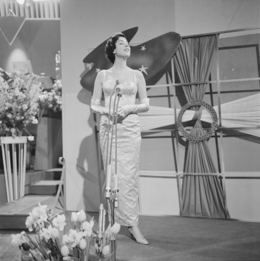 Corry Brokken, winner of the 1957 contest for the Netherlands.
Corry Brokken, winner of the 1957 contest for the Netherlands.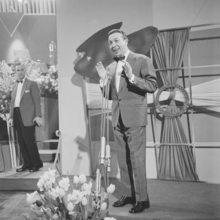 André Claveau, winner of the 1958 contest for France.
André Claveau, winner of the 1958 contest for France. Teddy Scholten, winner of the 1959 contest for the Netherlands.
Teddy Scholten, winner of the 1959 contest for the Netherlands..jpg) Jacqueline Boyer, winner of the 1960 contest for France.
Jacqueline Boyer, winner of the 1960 contest for France. Jean-Claude Pascal, winner of the 1961 contest for Luxembourg.
Jean-Claude Pascal, winner of the 1961 contest for Luxembourg.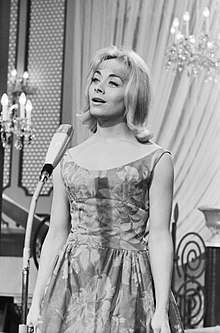 Isabelle Aubret, winner of the 1962 contest for France.
Isabelle Aubret, winner of the 1962 contest for France.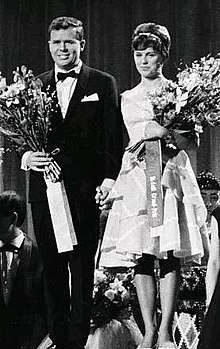
.jpg) Gigliola Cinquetti, winner of the 1964 contest for Italy.
Gigliola Cinquetti, winner of the 1964 contest for Italy.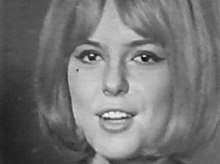 France Gall, winner of the 1965 contest for Luxembourg.
France Gall, winner of the 1965 contest for Luxembourg. Udo Jürgens, winner of the 1966 contest for Austria.
Udo Jürgens, winner of the 1966 contest for Austria.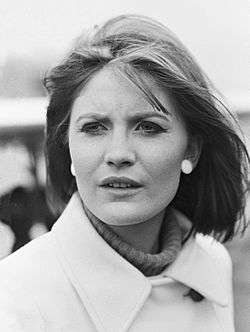 Sandie Shaw, winner of the 1967 contest for the United Kingdom.
Sandie Shaw, winner of the 1967 contest for the United Kingdom.
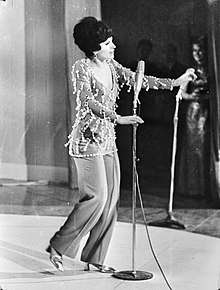
.jpg)
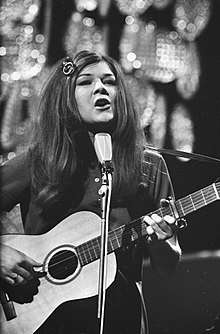 Lenny Kuhr, one of the four winners of the 1969 contest for the Netherlands.
Lenny Kuhr, one of the four winners of the 1969 contest for the Netherlands.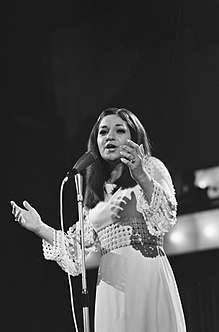 Frida Boccara, one of the four winners of the 1969 contest for France.
Frida Boccara, one of the four winners of the 1969 contest for France._zingt%2C_Bestanddeelnr_923-3687.jpg)
 Vicky Leandros, winner of the 1972 contest for Luxembourg.
Vicky Leandros, winner of the 1972 contest for Luxembourg. Anne-Marie David, winner of the 1973 contest for Luxembourg.
Anne-Marie David, winner of the 1973 contest for Luxembourg.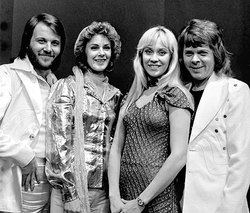
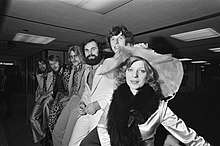
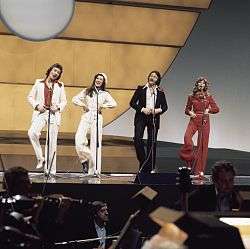 Brotherhood of Man, winners of the 1976 contest for the United Kingdom
Brotherhood of Man, winners of the 1976 contest for the United Kingdom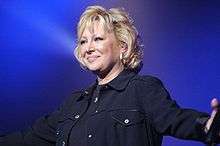 Marie Myriam, winner of the 1977 contest for France.
Marie Myriam, winner of the 1977 contest for France.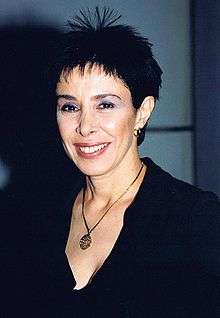
_winnaar_Johnny_Logan_in_aktie%2C_Bestanddeelnr_930-7803.jpg)
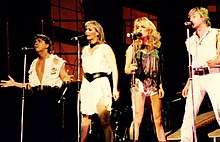 Bucks Fizz, winner of the 1981 contest for the United Kingdom.
Bucks Fizz, winner of the 1981 contest for the United Kingdom.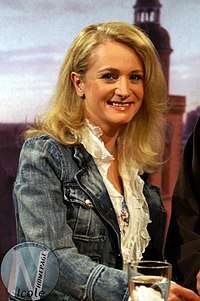 Nicole Hohloch, winner of the 1982 contest for Germany.
Nicole Hohloch, winner of the 1982 contest for Germany.
- Bobbysocks!, winners of the 1985 contest for Norway.
 Sandra Kim, winner of the 1986 contest for Belgium.
Sandra Kim, winner of the 1986 contest for Belgium. Celine Dion, winner of the 1988 contest for Switzerland.
Celine Dion, winner of the 1988 contest for Switzerland.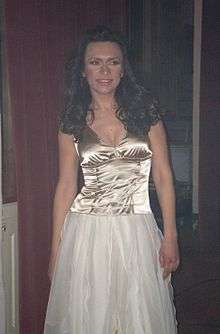
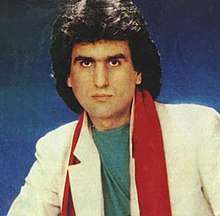 Toto Cutugno, winner of the 1990 contest for Italy.
Toto Cutugno, winner of the 1990 contest for Italy.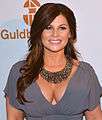 Carola Häggkvist, winner of the 1991 contest for Sweden.
Carola Häggkvist, winner of the 1991 contest for Sweden..jpg) Linda Martin, winner of the 1992 contest for Ireland.
Linda Martin, winner of the 1992 contest for Ireland.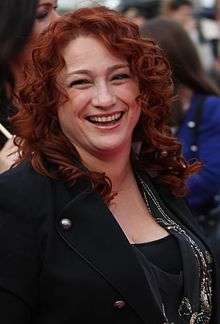 Niamh Kavanagh, winner of the 1993 contest for Ireland.
Niamh Kavanagh, winner of the 1993 contest for Ireland.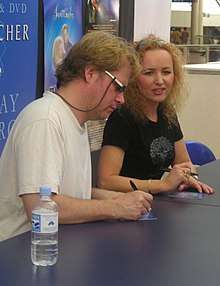 Secret Garden, winner of the 1995 contest for Norway.
Secret Garden, winner of the 1995 contest for Norway.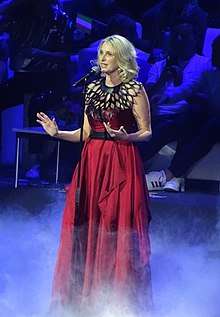 Eimear Quinn, winner of the 1996 contest for Ireland.
Eimear Quinn, winner of the 1996 contest for Ireland.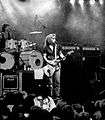 Katrina and the Waves, winners of the 1997 contest for the United Kingdom.
Katrina and the Waves, winners of the 1997 contest for the United Kingdom. Dana International, winner of the 1998 contest for Israel.
Dana International, winner of the 1998 contest for Israel. Charlotte Nilsson, winner of the 1999 contest for Sweden.
Charlotte Nilsson, winner of the 1999 contest for Sweden. Olsen Brothers, winners of the 2000 contest for Denmark.
Olsen Brothers, winners of the 2000 contest for Denmark.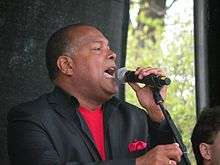
.jpg) Sertab Erener, winner of the 2003 contest for Turkey.
Sertab Erener, winner of the 2003 contest for Turkey..jpg)
 Helena Paparizou, winner of the 2005 contest for Greece.
Helena Paparizou, winner of the 2005 contest for Greece.
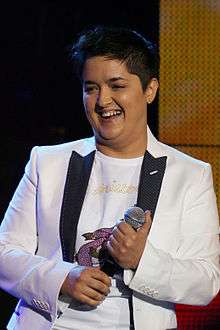 Marija Šerifović, winner of the 2007 contest for Serbia.
Marija Šerifović, winner of the 2007 contest for Serbia. Dima Bilan, winner of the 2008 contest for Russia.
Dima Bilan, winner of the 2008 contest for Russia.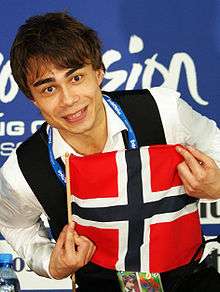 Alexander Rybak, winner of the 2009 contest for Norway.
Alexander Rybak, winner of the 2009 contest for Norway.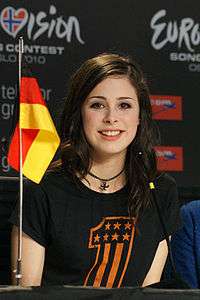
_cropped_2.jpg) Ell & Nikki, winners of the 2011 contest for Azerbaijan.
Ell & Nikki, winners of the 2011 contest for Azerbaijan.
.jpg) Emmelie de Forest, winner of the 2013 contest for Denmark.
Emmelie de Forest, winner of the 2013 contest for Denmark..jpg) Conchita Wurst, winner of the 2014 contest for Austria.
Conchita Wurst, winner of the 2014 contest for Austria. Måns Zelmerlöw, winner of the 2015 contest for Sweden.
Måns Zelmerlöw, winner of the 2015 contest for Sweden..jpg)
 Salvador Sobral, winner of the 2017 contest for Portugal.
Salvador Sobral, winner of the 2017 contest for Portugal._20180508_EuroVisionary_(cropped).jpg)
 Duncan Laurence, winner of the 2019 contest for the Netherlands.
Duncan Laurence, winner of the 2019 contest for the Netherlands.
Songwriters
_by_Erling_Mandelmann_-_2.jpg) Émile Gardaz, winner of the 1956 contest for Switzerland.
Émile Gardaz, winner of the 1956 contest for Switzerland.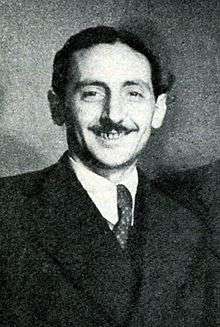 Nicola Salerno, winner of the 1964 contest for Italy.
Nicola Salerno, winner of the 1964 contest for Italy.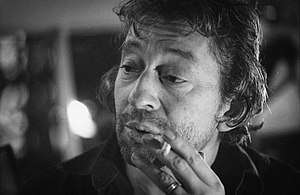 Serge Gainsbourg, winner of the 1965 contest for Luxembourg.
Serge Gainsbourg, winner of the 1965 contest for Luxembourg. Udo Jürgens, winner of the 1966 contest for Austria.
Udo Jürgens, winner of the 1966 contest for Austria..jpg) Manuel de la Calva and Ramón Arcusa (known as Dúo Dinámico), winners of the 1968 contest for Spain.
Manuel de la Calva and Ramón Arcusa (known as Dúo Dinámico), winners of the 1968 contest for Spain.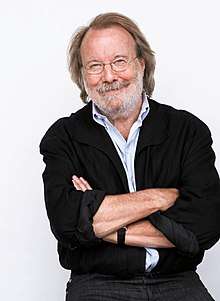 Benny Andersson, winner of the 1974 contest for Sweden.
Benny Andersson, winner of the 1974 contest for Sweden. Nurit Hirsh, winner of the 1978 contest for Israel.
Nurit Hirsh, winner of the 1978 contest for Israel._winnaar_Johnny_Logan_in_aktie%2C_Bestanddeelnr_930-7803.jpg)
 Toto Cutugno, winner of the 1990 contest for Italy.
Toto Cutugno, winner of the 1990 contest for Italy.
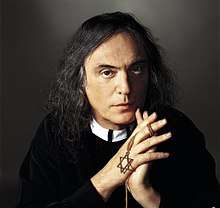 Zvika Pik, winner of the 1998 contest for Israel.
Zvika Pik, winner of the 1998 contest for Israel.- Maian Kärmas, winner of the 2001 contest for Estonia.
- Marie N, winner of the 2002 contest for Latvia.
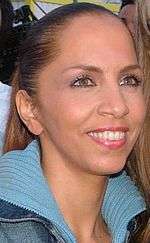 Sertab Erener, winner of the 2003 contest for Turkey.
Sertab Erener, winner of the 2003 contest for Turkey..jpg)
 Christos Dantis, winner of the 2005 contest for Greece.
Christos Dantis, winner of the 2005 contest for Greece.
 Dima Bilan, winner of the 2008 contest for Russia.
Dima Bilan, winner of the 2008 contest for Russia. Alexander Rybak, winner of the 2009 contest for Norway.
Alexander Rybak, winner of the 2009 contest for Norway.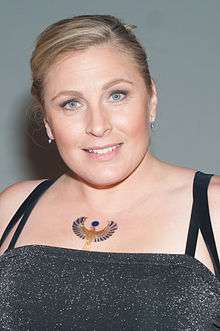 Julie Frost, winner of the 2010 contest for Germany.
Julie Frost, winner of the 2010 contest for Germany..jpg) Thomas G:son, winner of the 2012 contest for Sweden.
Thomas G:son, winner of the 2012 contest for Sweden. Thomas Stengaard(left), Julia Fabrin Jakobsen (center) and Lise Cabble (right), winner of the 2013 contest for Denmark.
Thomas Stengaard(left), Julia Fabrin Jakobsen (center) and Lise Cabble (right), winner of the 2013 contest for Denmark..jpg) Anton Malmberg Hård af Segerstad, winner of the 2015 contest for Sweden.
Anton Malmberg Hård af Segerstad, winner of the 2015 contest for Sweden.
 Doron Medalie, winner of the 2018 contest for Israel.
Doron Medalie, winner of the 2018 contest for Israel.
See also
- List of Eurovision Song Contest winning songwriters
- Eurovision Song Contest winners discography
- List of Junior Eurovision Song Contest winners
Notes and references
Notes
- Between 2004 and 2007, the contest included a single televised semi-final::— In 2004 the semi-final was held on the Wednesday before the final. Between 2005 and 2007 the semi-final was held on the Thursday of "Eurovision Week"
- Since 2008 the contest has included two semi-finals, held on the Tuesday and Thursday before the final.
- This song was partially sung in Hebrew.
- 1979, 1980, 1981, 1984, 1988, 1991, 1993, 1998, 2002 and 2003.
- Yugoslavia's 1989 victory is shown in the lower inset.
- Tie breaker between Finland and Portugal: Finland's next best placement is four times in 7th place, whereas Portugal's next best placement is twice in 7th place.
- Tie breaker between Poland and Serbia and Montenegro: Poland's next best placement is once in 8th place, whereas Serbia and Montenegro has no additional appearances.
- Tie breaker between Bosnia and Herzegovina and Moldova: Bosnia and Herzegovina's next best placement is once in 7th place, whereas Moldova's next best placement is twice in 10th place.
- Tie breaker between Croatia and Armenia: Croatia's next best placement is once in 5th place, whereas Armenia's next best placement is once in 7th place.
- Tie breaker between Lithuania, Belarus, and Czech Republic: Lithuania's next best placement is once in 9th place, the Czech Republic's next best placement is once in 11th place, whereas Belarus' next best placement is twice in 16th place.
- The country used to participate under the name F.Y.R. Macedonia (the former Yugoslav Republic of Macedonia) until it changed its name in February 2019.
- Tie breaker between Slovakia and Morocco: Slovakia placed in 18th place out of 23 contestants, whereas Morocco placed in 18th place out of 19 contestants
- This song was partially sung in Ukrainian.
- This song was partially sung in Crimean Tatar.
- Croatian (the language of the 1989 winning song) and Serbian (the language of the 2007 winning song) are fully mutually intelligible and often considered varieties of a single language, Serbo-Croatian. However, they are listed separately in Eurovision statistics.
References
- Extract from the rules for the 2007 Eurovision Song Contest. Eurovision.tv. Retrieved 22 August 2007. Archived 7 May 2007 at the Wayback Machine
- Eurovision 1956. Eurovision.tv. Retrieved 24 May 2008. Archived May 28, 2008, at the Wayback Machine
- O'Connor, John Kennedy. The Eurovision Song Contest – The Official History. Carlton Books, UK. 2007 ISBN 978-1-84442-994-3
- BBC News (6 December 2005). ABBA's Bjorn says no to reunion. Retrieved 15 March 2008.
- "Trophy". Eurovision Song Contest. Retrieved 31 May 2019.
- "Eurovision Crystal Trophy". Kosta Boda. Retrieved 31 May 2019.
- ABBA win 'Eurovision 50th' vote. BBC News (23 October 2005). Retrieved 22 August 2007.
Bibliography
| Wikimedia Commons has media related to Winners of the Eurovision Song Contest. |
- Eurovision Song Contest history. Eurovision.tv. Retrieved 19 August 2007.
- History. ESCtoday.com. Retrieved 19 August 2007.
- John Kennedy O'Connor (2005). The Eurovision Song Contest 50 Years The Official History. London: Carlton Books Limited. ISBN 1-84442-586-X.